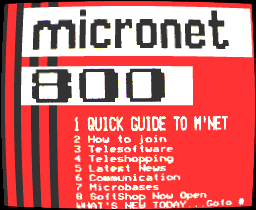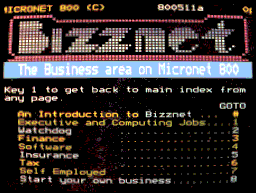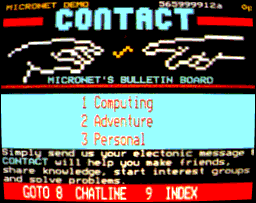| Communications |
Going on-line
Tap the network. Chris Bourne explores Micronet 800
BE HONEST. What do you think of when somebody says Micronet 800 to you? Come on, tell the truth. Isn't the image that of a bunch of hard-core hackers polluting screen after screen of pristine teletext with silly jokes, inane messages to mailbox numbers, and the chance to download a few free games of little consequence? Then there's the unwelcome sight of a vast phone bill leaving you bankrupt, starving and unable to afford a tube of toothpaste or a bar of soap.
Not that Micronetters use soap and toothpaste. Oh no, they're all too busy logging on or logging off, or breaking each other's codes, or just reading page after page of drivel about the latest digital coffee-blender.
If that's what you think - and there are plenty who do - don't think it anywhere near Peter Probert or Simon D'Arcy. They're the new team at Micronet, and they're out to drag Britain's biggest interactive database kicking and screaming into sobriety. They wear suits, they own ties, they mean business.
In truth, Micronet 800 has expanded mightily since we last ventured into its warrens. Then, in September last year, it was essentially a mailbox facility with some news pages, software you could buy or download free, one interactive game, and pages of technical help.
That's all still there - in fact, there's more of it than ever before - but as the number of subscribers increases, so too the demand for better and wider services grows. There are now 18,000 users, who between them access the system nine million times a month. "Instead of keeping it designed for people with a sole interest in computers, we're opening it up for hobbyists generally," says editor, Simon D'Arcy. He cites information on flying and amateur radio as examples.
"The basic difference between then and now," adds Peter Probert, in charge of publicity, "is that then it was a magazine. Now it's a communications network."
So what do you get from the new, bigger, better Micronet 800? And how do you go about getting it?
| The Gear |
Your own machine becomes a terminal to the mainframe - a keyboard for typing in information, messages and codes - while the modem interprets your computers output into something understood by the Micronet system, and vice versa.

Spectrum owners will probably buy the Prism VTX5000 modem, which was designed specifically for use with Micronet 800 - it costs around £45. The modem sits between the telephone system and your computer, so you will need a telephone which uses a jack-plug to a wall socket. British Telecom will do the conversion for you swiftly if you have the old-fashioned sort of telephone system where the wires go straight into the wall.
Finally, you need to join Micronet. The subscription costs £16.50 a quarter, which includes membership of Prestel - BT's giant database of which Micronet is a part. When you join, you get two codes - a ten digit entry code and a personal ID. "If anyone allows their ID to be hacked, they're still responsible for what's done using that ID," says Simon. "Change your passwords! Do it once a week, or more regularly still if you keep important information on Micronet."
Once you're enrolled in Micronet, you pay only the cost of a local 'phone call to access the system. That works out at 40 pence an hour after 6pm, and at weekends. There are extra frames which cost money to see, especially on Prestel - hut you will always be warned when you are about to add pennies onto your quarterly bill. Those range from a one penny frame to 99 pence for up-to-the-second business information on Prestel.
Generally, you won't pay more than a couple of pence per frame for those special areas, which include commercial information from private companies, and some of the big, set-piece games. Even so, it's possible to rack up big phone bills on Micronet, so he careful.
"The cost can be recouped in minutes with free Telesoftware," says Simon. Certainly Micronet 800 is the cheapest of all commercially run networks. And no matter where you live, you only pay phone charges at local rates - even if you have to access a computer miles away."
| What do you get? |
Newcomers to Micronet can find the scale of operation daunting at first. There are between 13,000 and 14,000 pages of editorial, up to 8,000 pages of software, and up to 4,000 pages of jokes, puzzles, competitions and the like under the heading Buttons, which is shared between Micronet and ordinary Prestel users alike.

In the old days, Micronet policy was to keep it all mysterious, and tease users into discovering what lurked behind the menu-driven access pages. That's changed. Simon D'Arcy likened the policy to that of booksellers wrapping hooks and magazines in cellophane so you can't see what's in them. "The shrinkwrap appeal is OK as long as people know what they're likely to get," he says. With a past career as a business consultant, he's adamant that Micronet should be much more accessible. So there's plenty of help to find your way around, including two indexes - a general A-Z index of all the frames and a fast index if you already know what you're looking for.
| Mailbox |
The heart of the system is still the mailbox service. Subscribers can get their own mailbox number, and send and receive messages to each other. As long as your friends are also on the system, it's cheaper than sending a letter and better than a phone call, because you don't have to wait for the other guy to be at home first.
When you have received new messages, you are told about it as soon as you boot up the system. You can have about 300 messages in your mailbox at a given time - according to Simon, nobody has ever run out of space. "I was a member of Micronet before I worked for it," says Simon. "I joined simply because of the mailbox system. It's an extremely cheap, easy way to keep in touch with your office."
Simon's convinced that serious business users can benefit from Micronet, even if they use more sophisticated and expensive systems for specialised work. Business users in particular will be interested to know that you can now make international Telex calls through Micronet as well - to anywhere in the world.
| Good conversation |
Mailbox is person-to-person conversation. If you want to shout it from the rooftops, von want to access the Chatline facility.

Chatline is a system where users can talk to each other freely through Micronet. You can sit back and watch the conversations unfold, or take part yourself - at a cost of two pence a message.
In olden times there was only one Chatline run from the Micronet office. Everything had to be typed in to a BBC computer and then fed down the line. Now it's all on mainframe, much faster - and there are eight separate Chatlines to use.
There are two different types. The normal Chatline - six of them - is slower but keeps a complete record of the whole day's conversation, so you can scroll back through the comments at will.
There are also two Daisychats, which have a mere 100 frames each. The frames form a loop, so when the line is full, the new comment simply overwrites the oldest. The Daisychats are very fast - on busy nights it's hard to read the latest message before it disappears.
The formal Chatlines are subdivided further. There's a political line, for armchair ministers. There's also a religious Chat line. Although obscenities and offensive comments are generally banned, the Micronet watchdogs are lenient. On the Religious line, however, speech is monitored.
There's even a Gay Chatline. Why?
"Well," says Simon, "it's a bit like CB Radio. A lot of gays are into CB because they can be anonymous. On Gay Chatline you can hide your identity, until you're confident enough to use Mailbox."
| Star quality |
There's also Celebrity Chatline. It operates like a phone-in every Wednesday night where you get to send in questions to a star personality. Recent interviewees ranged from Acorn bigwigs to pop star Fergal Sharkey, who's an avid Commodore user in his spare time. We sat in on an interview with Hitch-hiker specialist Douglas Adams.
The big drawback to Celebrity Chatline is the time lag - the old BBC system is still used, so answers are filtered through a Micronet journalist. Douglas clearly got a little bored with being asked whether there'd he a new Hitch-hiker hook again and again. The answer is no.
| Lonely hearts and brazen brains |
For more aggressive characters, there's a contact service which enables you to reach people with similar interests. That includes lonely heart sections, though it's hard to see what sort of a romance you can have in the middle of a mainframe computer. Problems with your micro are catered for, as well as problems with life in general on Soothe It.

For real exhibitionists, The Gallery is the thing. That costs money, but you get the chance to run your own teletext magazine. You hook up to 26 frames for a minimum of four months, and then put whatever you like on them jokes, articles, reviews, answers to correspondence and the like. The cost is on a sliding scale - 99 pence for the first four frames, then 50 pence for the rest, with a 10 pence charge to edit a frame. That works out at about £5-6 a month to run a 25 frame magazine.
Some of the Gallery items are very professional. Others are just plain funny. One contributor writes pages of mock-medical advice. "Ginseng has been found to cause short-sightedness and the flaky nail syndrome," he says. "Jogger's baldness can he cured by mineral water. Use Malvern for straight hair and Perrier for curly."
| Bizznet |
Business interests are catered for as well. Bizznet provides advice and information about business software, consumer rights, and starting up a company. But it's not just pages of information which are zapped onto your screen. Those services, and others on Micronet, are interactive - you send in your problems and get them answered. "It's a much more serious application of videotext than has been seen for some time," says Simon.
| The software |
"A lot of people thought Micronet was an alternative to playing games in amusement arcades," says Simon. Although he's developing new areas of activity the whole time, if games are your interest then there's still lots of fun to be had on the net. There are three types of game service available. There are the free programs - hundreds of them, which you can download into your Spectrum and play. Those vary in quality, hut there's usually something worthwhile.
Then there are programs you pay for. Some of those are utilities - such as software to adapt your modem in various ways, for instance, making the screen scroll. That's vital if you want to use a VTX5000 to play Multi-User Dungeon or access some of the more obscure bulletin hoards around the country.
You can also order software through Micronet from software houses, at a good discount. A copy of Elite would cost you £11.96 compared to £14.95 in the shops. "You'll be sent the game the day after you order it," promises Simon.

Then there are the interactive games - the sort of thing you can only play through networks like Micronet. Round Britain Race sets you to move around a map of Britain looking for the sites of various events or places. Each move costs one penny, and at the end of each game the winner scoops the pool.
There's also Starnet - off the system since July but back again in an improved version soon, according to Peter. That's a game of intergalactic empire-building; you run a planet initially and go on from there to conquer the galaxy. You can make or break alliances with other players, and the action often spills over into the Mailbox area as secret conspiracies are formed between players. The new version can cater for 500 players - it's the sort of experience you can't get anywhere else.
Micronet is very sensitive about problems of hacking. "We can see the appeal of hacking," says Peter, "but we want to make Micronet a viable alternative to hacking." That may become more of a reality soon one idea is to have an area specially set up for hackers, with all the best security devices Micronet can invent. The idea being to hack into it and leave your name on the central frame.
| End frame |
We haven't even touched on the news coverage offered by Micronet, the reviews of software, books, films ...
As Simon says, "There's more put onto Micronet every day than anyone could possibly read." When you compare that with Peter's statement that, "Micronet is about to he born," you begin to see the potential of the system. "The only thing holding us back," says Peter, "is Prestel itself - the limitations imposed by their system of Teletext. But we're getting more influential all the time - we can push British Telecom into letting us do things like Chatline and Gallery."
The idea of pushing BT around is a little daunting, hut with 18,000 Micronetters behind you it seems you can go anywhere.